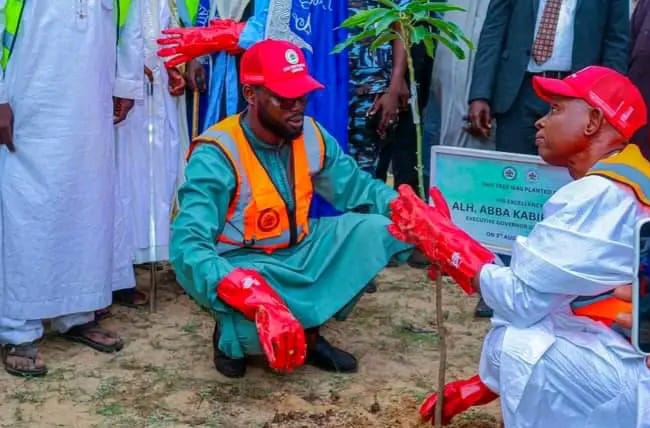The government of Nigeria’s Kano State has launched a large-scale tree-planting initiative to curb the advance of desertification and bolster ecological resilience. Governor Abba Yusuf announced the distribution of 5.5 million seedlings across the state’s 44 local government areas, part of a broader strategy to combat environmental degradation in the semi-arid region. The plan, disclosed in a Monday statement by gubernatorial spokesperson Sunusi Dawakin-Tofa, aims to strengthen community involvement in sustainability efforts while addressing the growing threat of land degradation.
Under the program, local governments will allocate saplings to schools, neighborhoods, and institutions, with explicit instructions to establish planting committees to oversee implementation. Yusuf emphasized that trees will be strategically placed in educational facilities, places of worship, and along roadways to maximize shade, reduce erosion, and improve air quality. “This is a collective effort to protect our environment for future generations,” he said, framing the initiative as both an ecological safeguard and a public health priority.
The move aligns with wider land restoration projects in Kano, where authorities have reclaimed approximately 250,000 hectares of degraded terrain through ACReSAL (Agro-Climatic Resilience in Semi-Arid Landscapes), a World Bank-supported program operational across 19 northern Nigerian states. This federal partnership focuses on sustainable land management, water conservation, and climate adaptation—critical concerns in regions facing intensified droughts and shifting rainfall patterns linked to climate change.
Environmental analysts note that northern Nigeria has lost significant vegetation cover over decades due to deforestation, overgrazing, and unsustainable farming practices, with desert fronts advancing southward at estimated rates of 0.6 kilometers annually. Kano’s latest intervention reflects a growing recognition of afforestation’s role in stabilizing soils, sequestering carbon, and preserving biodiversity. However, experts caution that long-term success requires sustained community engagement, maintenance of saplings, and integration with policies addressing root causes like poverty-driven resource exploitation.
While similar tree-planting campaigns have faced challenges elsewhere—including low survival rates for non-native species—state officials stress they are prioritizing drought-resistant indigenous varieties. The initiative also dovetails with Nigeria’s commitments under international climate agreements, including its pledge to restore 4 million hectares of degraded land by 2030. As global temperatures rise, such localized efforts in vulnerable regions are increasingly seen as frontline defenses against ecological collapse and its socioeconomic ripple effects.
